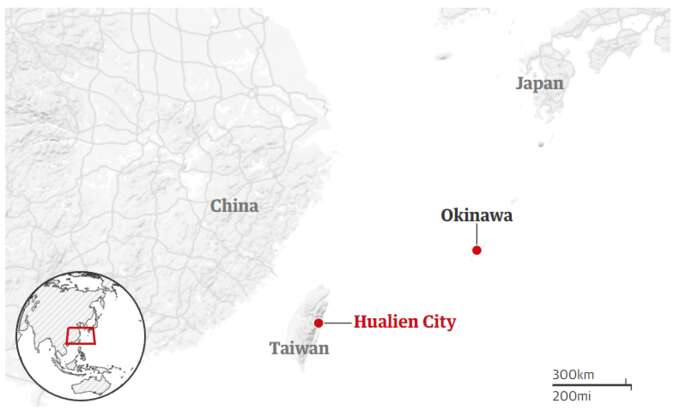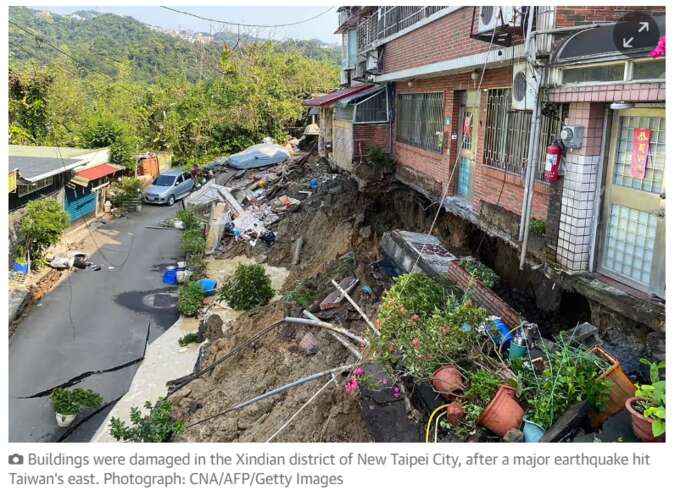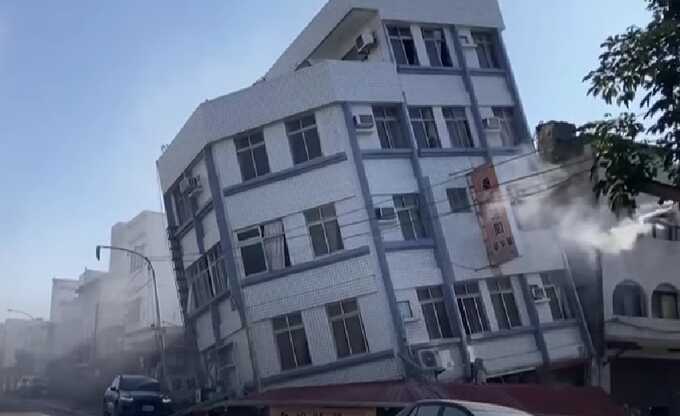7.4 magnitude quake hits Taiwan, strongest in 25 years
People rescued from buildings in cities of Hualien and Taipei amid continuing aftershocks from Taiwan’s strongest quake in decades
Taiwan’s strongest earthquake in 25 years has killed four and injured at least 50, causing building collapses, power outages and landslides on the island, and sparking initial tsunami warnings in southern Japan and the Philippines.
The quake, given a magnitude of 7.7 by Japan’s meteorological agency, struck close to the popular tourist city of Hualien, on Taiwan’s eastern coast, damaging buildings and trapping people amid aftershocks following the quake, which started at 7.58am.
Videos on social media showed children being rescued from collapsed residential buildings. One five-storey building in Hualien appeared heavily damaged, its first floor collapsed and the bulk of the building leaning at a 45-degree angle.
Taiwan’s Centre for Science and Technology (CST) said people and vehicles were trapped in the Dachingshui tunnel. Train lines were also damaged, and schools and workplaces were closed across large areas of the city.
Witnesses in Hualien described driving while rocks dislodged from nearby mountains fell down around them, while others rushed outside after feeling the strength of the tremors.
Further north, part of the headland of Guishan Island, a tourist attraction also known as Turtle Island because of its shape, slid into the sea. In the capital, Taipei, several people were rescued from a partially collapsed warehouse, and tiles fell from buildings.
Although it was measured at 7.7 in Japan, Taiwan’s earthquake monitoring agency gave the magnitude of Wednesday’s quake as 7.2, making it Taiwan’s strongest since 1999, when a 7.6-magnitude quake 93 miles (150 km) south of Taipei killed 2,400 and injured 10,000.
Hualien’s last big quake was in 2022, when a 6.9-magnitude tremblor toppled buildings and derailed a train, killing one person and cutting off power for thousands of residents.
Wednesday’s quake caused TSMC, Taiwan’s leading semiconductor manufacturer, that is responsible for the production of most of the world’s advanced semiconductors, to evacuate its production lines, according to Bloomberg News.

Taiwan’s CST said more than 15 aftershocks exceeding a magnitude of 4.0 had occurred so far, but the magnitude has been decreasing.
Damage was visible on some buildings in central Taipei, such as outside the Howard Plaza hotel, where the earthquake had damaged brickwork and dislodged some of the lettering on the hotel’s sign.
Mike Hung Hsu, a hotel guest from the US, said he was woken up by the earthquake. “I’ve never felt this kind of earthquake in LA, even though we have earthquakes pretty often,” he said. “I used to live in Taiwan, in my memory we never had an earthquake like this one.”
Japanese media initially said the quake could trigger waves as high as three metres in some areas of Okinawa prefecture, located roughly 1,600km south of Tokyo, but the forecasts were later downgraded. Japan’s meteorological agency lifted all tsunami advisories at around noon local time, while the chief cabinet secretary, Yoshimasa Hayashi, said there had been no reports of injury or damage.

However, an official from Japan’s meteorological agency urged people to continue evacuating until the advisory was lifted. Some residents of the main Okinawa island had evacuated to a nearby US military base, media reports said, while footage showed others watching the sea from the safety of high ground in the prefectural capital, Naha.
The agency has warned that aftershocks, with a similar intensity to those felt in Taiwan, may be likely over the next week.
The United States Geological Survey (USGS) said the quake’s epicentre was 18km (11 miles) south of Taiwan’s Hualien city at a depth of 34.8km.
The Philippines’ seismology agency on Wednesday issued a tsunami warning for coastal areas fronting the Pacific Ocean, saying they were expected to experience “high tsunami waves” but later lifted the warning.
It has only been three months since a magnitude-7.6 quake and tsunami killed 244 people and caused widespread damage on the Noto peninsula in Ishikawa prefecture on the Japan Sea coast.
Japan’s biggest earthquake on record was a massive 9.0-magnitude undersea jolt in March 2011 off Japan’s northeast coast, which triggered a tsunami that left around 18,500 people dead or missing.
Read more similar news:
Comments:
comments powered by Disqus


































